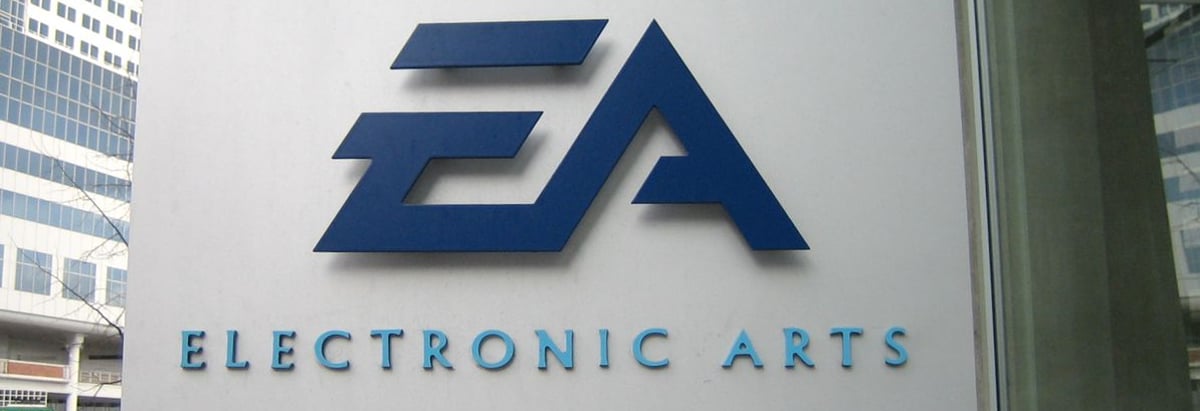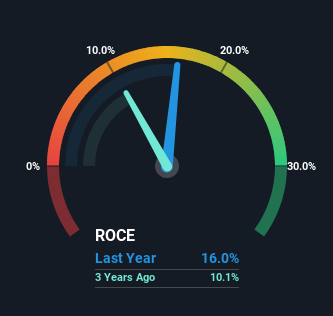
If we want to find a potential multi-bagger, often there are underlying trends that can provide clues. In a perfect world, we'd like to see a company investing more capital into its business and ideally the returns earned from that capital are also increasing. If you see this, it typically means it's a company with a great business model and plenty of profitable reinvestment opportunities. So, when we ran our eye over Electronic Arts' (NASDAQ:EA) trend of ROCE, we liked what we saw.
Return On Capital Employed (ROCE): What Is It?
For those that aren't sure what ROCE is, it measures the amount of pre-tax profits a company can generate from the capital employed in its business. The formula for this calculation on Electronic Arts is:
Return on Capital Employed = Earnings Before Interest and Tax (EBIT) ÷ (Total Assets - Current Liabilities)
0.16 = US$1.7b ÷ (US$13b - US$3.1b) (Based on the trailing twelve months to March 2024).
Therefore, Electronic Arts has an ROCE of 16%. In absolute terms, that's a satisfactory return, but compared to the Entertainment industry average of 11% it's much better.
See our latest analysis for Electronic Arts

In the above chart we have measured Electronic Arts' prior ROCE against its prior performance, but the future is arguably more important. If you'd like, you can check out the forecasts from the analysts covering Electronic Arts for free.
What Does the ROCE Trend For Electronic Arts Tell Us?
The trend of ROCE doesn't stand out much, but returns on a whole are decent. The company has consistently earned 16% for the last five years, and the capital employed within the business has risen 54% in that time. Since 16% is a moderate ROCE though, it's good to see a business can continue to reinvest at these decent rates of return. Stable returns in this ballpark can be unexciting, but if they can be maintained over the long run, they often provide nice rewards to shareholders.
The Bottom Line
In the end, Electronic Arts has proven its ability to adequately reinvest capital at good rates of return. Therefore it's no surprise that shareholders have earned a respectable 64% return if they held over the last five years. So while the positive underlying trends may be accounted for by investors, we still think this stock is worth looking into further.
Electronic Arts could be trading at an attractive price in other respects, so you might find our free intrinsic value estimation for EA on our platform quite valuable.
For those who like to invest in solid companies, check out this free list of companies with solid balance sheets and high returns on equity.
Valuation is complex, but we're here to simplify it.
Discover if Electronic Arts might be undervalued or overvalued with our detailed analysis, featuring fair value estimates, potential risks, dividends, insider trades, and its financial condition.
Access Free AnalysisHave feedback on this article? Concerned about the content? Get in touch with us directly. Alternatively, email editorial-team (at) simplywallst.com.
This article by Simply Wall St is general in nature. We provide commentary based on historical data and analyst forecasts only using an unbiased methodology and our articles are not intended to be financial advice. It does not constitute a recommendation to buy or sell any stock, and does not take account of your objectives, or your financial situation. We aim to bring you long-term focused analysis driven by fundamental data. Note that our analysis may not factor in the latest price-sensitive company announcements or qualitative material. Simply Wall St has no position in any stocks mentioned.
Have feedback on this article? Concerned about the content? Get in touch with us directly. Alternatively, email editorial-team@simplywallst.com
About NasdaqGS:EA
Electronic Arts
Develops, markets, publishes, and delivers games, content, and services for game consoles, PCs, and mobile phones worldwide.
Adequate balance sheet and slightly overvalued.
Similar Companies
Market Insights
Community Narratives



